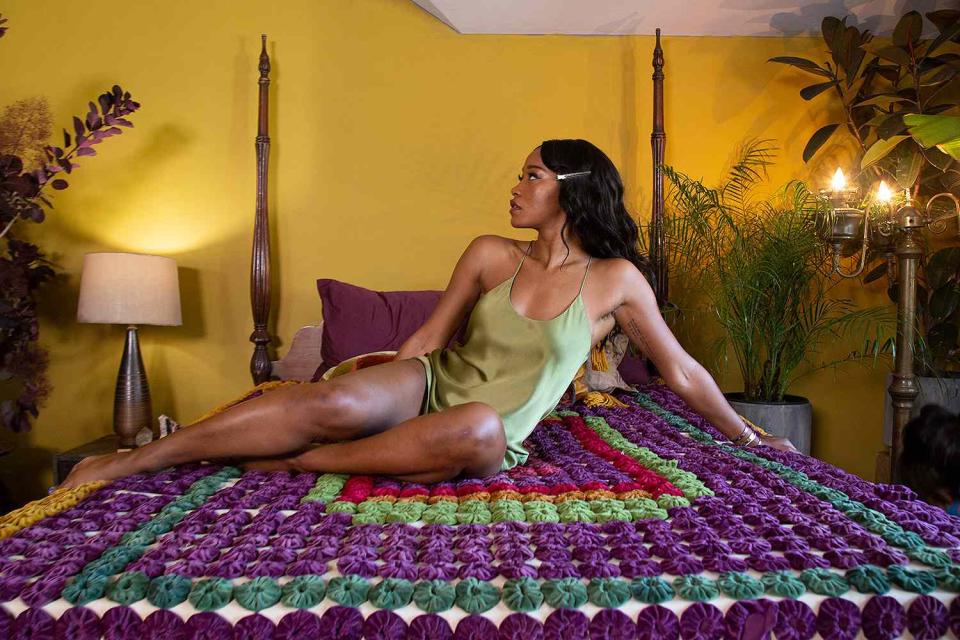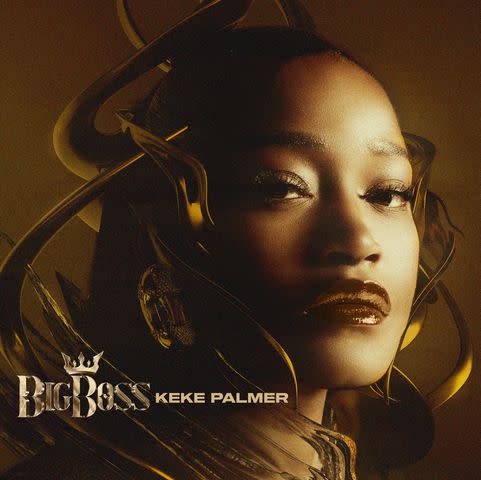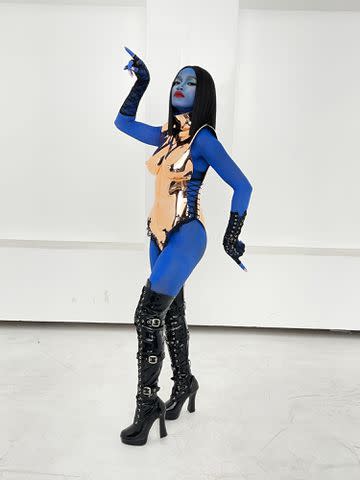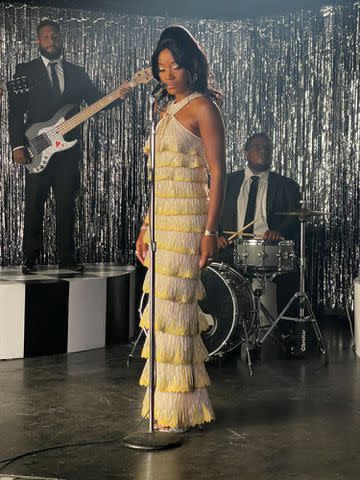Keke Palmer Says the Me Too Movement Should Happen in the Music Industry: 'Everybody's a Crooked Cop' (Exclusive)
- Oops!Something went wrong.Please try again later.
Palmer tells PEOPLE about her new visual album Big Boss, which chronicles her journey in music, from business setbacks to "countless" instances of sexual harassment

After more than two decades in the entertainment industry, Keke Palmer is getting real about her experience.
The Nope star and new mother released her new album Big Boss on Friday alongside a self-written accompanying film that marks her directorial debut and chronicles her journey within the music industry, from business setbacks to instances of sexual harassment.
While Palmer, 29, is best known as an actress, she signed to Atlantic Records at age 12 shortly after making her first onscreen appearance in 2004's Barbershop 2: Back in Business and released her debut album So Uncool in 2007. Following a series of false starts and label deals with Interscope and Island Records over the next decade, she launched her own Big Bosses Entertainment label in 2018 and has since been able to freely put out music as she pleases.
Released through her new streaming network KeyTV, Big Boss sheds light on the highs and lows she's faced while working her way from child star to acclaimed actress, musician and businesswoman. In addition to Palmer, the film stars her mom and longtime manager Sharon (as herself) as well as fellow ex-Disney Channel actors Skai Jackson, Kyle Massey and Robert Ri'chard — all of whom can relate to some of the industry plights she's faced on the road to success.
Palmer recently spoke to PEOPLE about making the vulnerable album and film, shedding light on sexual harassment in the music industry and taking control of her own career with Big Bosses Entertainment and KeyTV.
Related:Keke Palmer Talks Post-Baby Body, Says New Moms Should Do 'Whatever Makes You Feel Good' (Exclusive)
Big Boss takes viewers through the ups and downs of your music journey. Why do you feel like it's important to tell this story?
I think everybody's going through something similar in whatever their respective job is, or even those of us that are actually also working in the music industry — not even just artists, but producers, writers or whatever. We all know what it's like to be in a space where we're dealing with tons of misogyny and then trying to get people to just see you and your value and then ultimately realizing that you go where you are valued and that you don't need to actually force anything. If they see it, great. If they don't, you've got to move on and create a space that is more conducive for your mental wellbeing and creative flow. I just wanted to share that I've gone through it. I experienced my own hardships, and "Hey, this is how I dealt with it, and this is how I moved on." This is my testimony in so many ways.
You get to combine your talents as an actor and musician, and also show the world your writing and directing skills. How does it feel to be able to put all of those skills into one project?
It feels like the way it always should have been. I love stretching all my wings at once. Even when I think about Nope, all the different things that I was able to do in that, I think I'm somebody that really enjoys to showcase all that stuff and have fun with those different skills. I feel like Big Boss was just an opportunity for me to bounce everything off of one another, which was great.

Related:Angela Bassett Reacts to Keke Palmer's Hilarious Impression of Her: 'You Do a Great Job'
What sets this project apart from your previous music releases? How is the focus for you different than it's been given everything you've learned?
What sets it apart is the space that I'm in now, my ability to really go forward and not feel like something is missing. I think a lot of times artists can put themselves in a place where they feel like they have to ask for permission and then they feel like, "Oh, someone else needs to tell me, 'Yes, this is the thing.'" I'm just in a place now where — not to say I'm not collaborative or I don't care what other people say, but essentially there's a part of me that doesn't really care what other people say. 'Cause if I believe in it, then that's what's going to make the difference. I think that me not being afraid to do my own thing is what's made the biggest difference where I'm at currently as an artist.
Your music career kicked off when you were 12 and signed with Atlantic Records, and since then you've been with Interscope and Island Records, and now you're on your own label, Big Bosses Entertainment. Can you tell me about your experiences with those major record labels and why you decided to go independent?
It was just really stifling. I learned a lot of stuff just about what I really needed as an artist, which was artist development. I really spent a lot of those years figuring out what went wrong or why things weren't connecting for me as an artist. I think with labels, there isn't any artist development. A lot of times they'll try stuff to throw stuff out, then it doesn't work and it's your fault. They don't really support the artists in being able to discover how to share their voice, how to tell their story.
It's almost like, to connect it to breastfeeding, it's like breastfeeding is a natural thing, but getting into it doesn't come to you naturally. I think that's what it's like being an artist. I'm talented, I can sing, I can perform, I can do all that, but knowing how to present that to the world, there's still an art to that. My experience with labels taught me that I had to figure that out because they weren't able to really help me with it.

Related:JoJo Says Taylor Swift Sympathized with Her Over Label Lawsuit Years Before Her Own Masters Drama
Your mom appears in the film as herself. She's your longtime manager and now your business partner, and Big Boss reveals that your career placed some pressure on you and your bond with her. What caused that pressure, and how have you two worked to maintain a healthy and positive relationship?
It definitely started with me being able to really just create boundaries, speak up and talk about what I'm not OK with and when I need a break and, "Hey, let's not talk about work right now." I think a big part of it is learning how to actively separate space for me to be normal and me to be this working talent because the lines get blurred when family dinner can easily turn into a business meeting. So, it's learning how to say, "Hey, no, this is the thing," and it's just as important for her as it is for me. We're both so similar, so it's not even like she wanted to or was trying to do some of these things, it just kind of happened because that's what we were living, eating and breathing. It's been a journey for us both to learn how to separate it, and I think she's done a great job.
This film also sees you deal with a lot of misogyny within the industry, and there's a situation where a fellow artist claims that women have to have sex with him in order to collaborate. You opened up a few years ago about an uncomfortable situation that you had on the set of a music video with Trey Songz. What inspired those scenes in Big Boss?
Those scenes are real. Those scenes are not actually inspired by that moment. Obviously, people know that moment and are aware of that scenario from when it happened and when I spoke about it. But that just goes to show, that was one of many moments where things go down in this industry. Not always did I say something, but I said something in that particular situation because my likeness was being used, and I'm just a business person in that regard. But as far as being in an uncomfortable situation as a woman, where I'm either being sexually harassed, intimidated or just being made uncomfortable in a space that's dominated mostly by men, those are very real people, and that's a very real, accurate situation. And there are countless others.

Related:Keke Palmer Says She Will Take Legal Action After Alleging 'Sexual Intimidation' by Trey Songz
How have you worked through those kinds of situations and learned to stand up for yourself?
I think by literally standing up for myself, not allowing for a moment to go by if I feel like I need to say something — and I'm going to say something. I started to really work hard to remove myself from those situations. The situation in that scene was after, I think, the incident [with Songz]. As I depicted in the film, it was somebody who I thought was a friend, where I'm thinking that I'm putting myself maybe in better situations, but I continuously will find myself around people in weird situations that I thought were friends or family. That's probably the bigger thing. When all that stuff went down, people kept saying, "Oh, well why did she do this?" Well, because I thought I could trust this person, and that's the unfortunate thing.
Being a woman is like, "Damn, the biggest mistake you can make is trusting somebody." Damn, I just shouldn't have trusted someone? I wish that there was more that we could do, but it seems like we can't even really expect for people to respect our boundaries. Now, my best way of coping is to just not go places alone, not really let my hair down, not really get too comfortable. I mean, I've had to do so much preventative s— because I can't trust people to behave. The sad thing is that you learn these things from being in bad situations. It almost feels like it's a coming-of-age story for a woman. It's like, "Damn. I didn't know I couldn't do this until this happened. Damn, now I've got to be more careful. Wow." It's this very heavy weight.
You speak in the film about how that aspect of the music world is different from the acting world. We've seen the Me Too movement within the acting world, but that hasn't happened in music.
Exactly. I think that's the point. It hasn't happened in music, and it should. Bad s— happens in all industries, obviously, but specifically entertainment. We know bad things happen in all of them, but it's almost like the acting world represents a union and the music industry represents non-union. It's happening in the actor world but eventually, it's going to come to a damn halt. Somebody's going to get called out. Something's going to happen. At some point, we're going to come to some kind of understanding. With music, it's like everybody is being paid, and everybody's a crooked cop. So, it seems like nothing will ever really come to a head.
RELATED VIDEO: Keke Palmer Talks Post-Baby Body, Says New Moms Should Do 'Whatever Makes You Feel Good'
You've been releasing music for nearly two decades, but acting is what's made you such a superstar. Given all the setbacks you've faced in the music industry, did you ever just consider stepping away from that world?
Yeah, all the time. All the time I've thought about stepping away and somehow would find myself back again.
I'm happy that you have. Big Boss is going to be released on your new streaming network, KeyTV. How does it feel to be running your own network?
It feels really, really, really cool. Launching it was definitely a journey and trying to figure out how to actually just go for it. It was definitely a learning process, but again, to create something from the beginning and actually see it flourish and grow is just a magnificent feeling and experience. I'm just really grateful, and I can't wait to continue to see where it goes. We're getting ready to shoot a bunch of new scripted and unscripted series, and we're always working with new people. We got some great kids from The LA Film School that are going to be directing a project we're filming later this month. So again, just shining a light on those new voices, new perspectives and being a place where we can help people of color, young millennials and Gen Z-ers be able to tell their stories.
What do you hope viewers and listeners take away from Big Boss?
You know what, I just hope that they take from it that it doesn't have to start with the team, it just has to start with you, and that's enough. If you do that, then you'll get where you're trying to go. Remember that your voice counts, and your voice is the main voice that matters. Never let anything else come between that.
For more People news, make sure to sign up for our newsletter!
Read the original article on People.

